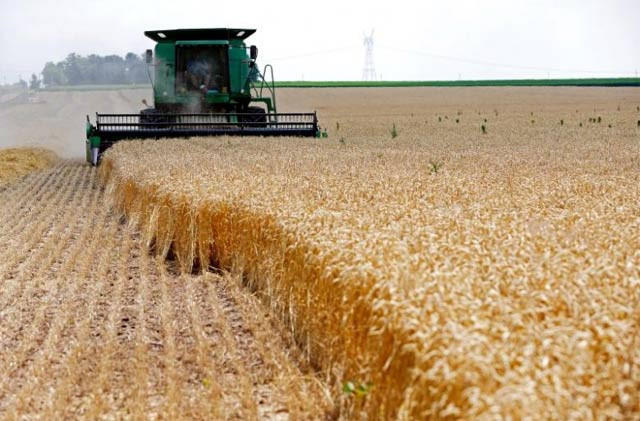Govt dismisses wheat company proposal

Food ministry requests creation of special purpose vehicle to manage commodity’s stocks
“However, the food department ignored these requests,” he said. According to Rehman, he sold the wheat stock to districts and sent the amount of Rs500 million collected back to food department. PHOTO: REUTERS
ISLAMABAD:
The country’s economic managers have rejected the establishment of a special purpose vehicle (SPV) to manage wheat stocks after winding up Pakistan Agricultural Storage and Services Corporation (Passco).
Sources told The Express Tribune that in a recent meeting of the Economic Coordination Committee (ECC), the Finance Division pointed out that the relevant summary needed to be examined in detail; therefore, it should be resubmitted. The ECC was informed that some of the proposals pertained to the Cabinet Committee on State-Owned Enterprises, which should be submitted to that body. The ECC considered the summary submitted by the Ministry of National Food Security & Research titled “Winding Up of Passco and Establishment of Special Purpose Vehicle (SPV) – Wheat Stock Management Company (WSMC) Public Limited” and rejected the proposal. It directed officials to resubmit the summary in the next meeting as a regular agenda item.
The food ministry had sought approval for setting up the SPV, named Wheat Stocks Management Company, under the Companies Act 2017, with initial paid-up capital of Rs1 million and authorised capital of Rs150 billion.
The objective of the company should be to arrange long-term financing from banks with government guarantee and the stipulation that the funds raised would be utilised to settle Passco’s leftover liabilities. The ministry also sought authorisation to prepare and submit draft documents for the proposed SPV, including the Memorandum and Articles of Association, for vetting by the Law and Justice Division.
It asked for the green light to issue a notification in the official gazette, in terms of Seventh Schedule of the Companies Act 2017 to prescribe an incorporation fee of Rs10,000 for the SPV, being a wholly owned government company, irrespective of its authorised share capital.
The ministry sought the nod for meeting expenditures pertaining to incorporation of the SPV, including its name, reservation fee, filing fee and other statutory charges, and for the paid-up capital from budgetary allocations through re-appropriation within the ministry.
The food ministry urged ECC to exempt the proposed company from provisions of the State-Owned Enterprises (Governance and Operations) Act 2023 read with Clause 5 of the State-Owned Enterprises (Ownership and Management) Policy 2023, given that the SPV would have no commercial operations. Upon fulfillment of its mandate, the SPV will be dissolved through a liquidation process in accordance with Section 347 of the Companies Act 2017.
With approval of the cabinet, the Ministry of National Food Security tabled a summary titled “Winding up Passco and Establishment of Special Purpose Vehicle (SPV) Wheat Stock Management Company.” It stated that Passco, a public limited company incorporated under the Companies Ordinance 1984 (now Companies Act 2017), had been established with the mandate to procure wheat for building reserves.
In the backdrop of the redefined role of the federal government in wheat operations, the Prime Minister’s Office, through directives dated September 12, 2024 and March 21, 2025, instructed the winding up of Passco after stakeholder consultations and advised the development of an alternative mechanism for maintaining strategic wheat reserves. Thereafter, the PM Office, vide its directive dated August 25, 2025, told the finance minister to lead the process of Passco’s winding up in coordination with the Ministry of National Food Security. In that regard, a committee headed by the finance minister held five meetings – on September 2, 5, 11 and 19 and October 10, 2025 – to deliberate on the modalities of disposing of wheat stocks, settling Passco liabilities and its eventual winding-up.
Among other matters, the settlement of Passco receivables from provinces amounting to Rs52,706.4 million through the proceeds of wheat sale was discussed along with the disposal of stock and settlement of liabilities. The food ministry informed ECC that since residual costs could not be immediately met through budgetary resources, it was decided that the SPV should be empowered to arrange financing from banks under the government’s sovereign guarantee.



